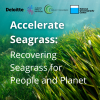|
Posted: 21 November 2024
 Expert knowledge of how early sea surface temperature measurements were taken has helped to explain a cold anomaly in early 20th century climate data.
The cold period, between 1900 and 1930, has puzzled scientists for decades, as the sea surface temperature measurements were much colder than...
Expert knowledge of how early sea surface temperature measurements were taken has helped to explain a cold anomaly in early 20th century climate data.
The cold period, between 1900 and 1930, has puzzled scientists for decades, as the sea surface temperature measurements were much colder than... |
|
Posted: 12 November 2024
 A new study by the National Oceanography Centre (NOC) in Southampton has revealed where marine heatwave events are most likely to occur in UK waters, for the first time.
With climate change continuing to raise global temperatures, study authors are calling for more targeted research to...
A new study by the National Oceanography Centre (NOC) in Southampton has revealed where marine heatwave events are most likely to occur in UK waters, for the first time.
With climate change continuing to raise global temperatures, study authors are calling for more targeted research to... |
|
Posted: 5 November 2024
 Two new chief scientists have been appointed to the National Oceanography Centre’s (NOC) Marine Autonomous Robotic Systems (MARS) Group.
Dr Veerle Huvenne and Dr Filipa Carvalho will work to increase engagement with the marine science community, raise awareness of the robotics...
Two new chief scientists have been appointed to the National Oceanography Centre’s (NOC) Marine Autonomous Robotic Systems (MARS) Group.
Dr Veerle Huvenne and Dr Filipa Carvalho will work to increase engagement with the marine science community, raise awareness of the robotics... |
|
Posted: 1 November 2024
 The National Oceanography Centre (NOC) is calling on scientists and researchers to participate in its fourth annual Socio-Oceanography Workshop, hosted in collaboration with the Marine Social Science Network.
This international event, set to take place at NOC’s Southampton site 26-28...
The National Oceanography Centre (NOC) is calling on scientists and researchers to participate in its fourth annual Socio-Oceanography Workshop, hosted in collaboration with the Marine Social Science Network.
This international event, set to take place at NOC’s Southampton site 26-28... |
|
Posted: 29 October 2024
 The future direction of the UK’s marine research infrastructure and how to succeed in taking on solo global ocean challenges are on the keynote billboard for this year’s tenth Marine Autonomy and Technology Showcase (MATS), organiser the National Oceanography Centre (NOC) has...
The future direction of the UK’s marine research infrastructure and how to succeed in taking on solo global ocean challenges are on the keynote billboard for this year’s tenth Marine Autonomy and Technology Showcase (MATS), organiser the National Oceanography Centre (NOC) has... |
|
Posted: 24 October 2024
 ‘Protecting the ocean so that it continues to protect us’
Leading European ocean scientists, including Dr Katya Popova from the UK’s National Oceanography Centre (NOC), have launched Navigating the Future VI (NFVI), providing governments, policymakers, and funders with robust,...
‘Protecting the ocean so that it continues to protect us’
Leading European ocean scientists, including Dr Katya Popova from the UK’s National Oceanography Centre (NOC), have launched Navigating the Future VI (NFVI), providing governments, policymakers, and funders with robust,... |
|
Posted: 23 October 2024
 New research supported by National Oceanography Centre (NOC) scientists has found that oceanographic connectivity (the movement and exchange of water between different parts of the ocean) is a key influence for fish abundance across the Western Indian Ocean (WIO).
Connectivity particularly...
New research supported by National Oceanography Centre (NOC) scientists has found that oceanographic connectivity (the movement and exchange of water between different parts of the ocean) is a key influence for fish abundance across the Western Indian Ocean (WIO).
Connectivity particularly... |
|
Posted: 9 October 2024
 A new programme announced today by Climate Impact Partners and Deloitte, in collaboration with Project Seagrass, will channel critical funding to the UK’s National Oceanography Centre (NOC) to support UK seagrass restoration and unlock long-term finance to save and restore seagrass meadows...
A new programme announced today by Climate Impact Partners and Deloitte, in collaboration with Project Seagrass, will channel critical funding to the UK’s National Oceanography Centre (NOC) to support UK seagrass restoration and unlock long-term finance to save and restore seagrass meadows... |
Understanding regional climate change essential for effective climate adaptation policy, study finds Posted: 1 October 2024
 A new study of regional climate data has highlighted a need for a region-specific focus on emerging climate change signals to underpin more effective local adaptation policies.
The study, co-authored by scientists from the National Oceanography Centre (NOC) and published in Frontiers in...
A new study of regional climate data has highlighted a need for a region-specific focus on emerging climate change signals to underpin more effective local adaptation policies.
The study, co-authored by scientists from the National Oceanography Centre (NOC) and published in Frontiers in... |
|
Posted: 26 September 2024
 The UK’s National Oceanography Centre (NOC) is trialling the use of a fossil-free marine diesel to fuel the Royal Research Ships (RRS) James Cook and Discovery.
Use of hydrotreated vegetable oil (HVO), made from used vegetable oils and fats and non-food crops, is able to significantly...
The UK’s National Oceanography Centre (NOC) is trialling the use of a fossil-free marine diesel to fuel the Royal Research Ships (RRS) James Cook and Discovery.
Use of hydrotreated vegetable oil (HVO), made from used vegetable oils and fats and non-food crops, is able to significantly... |
